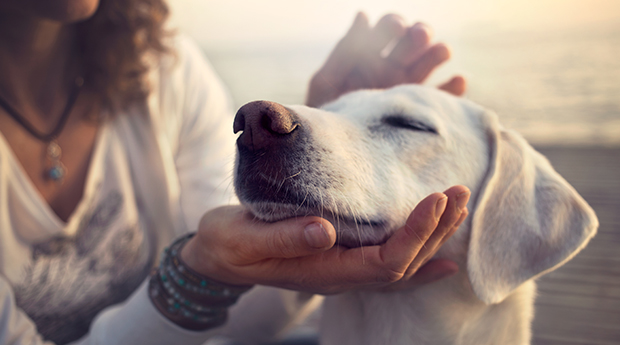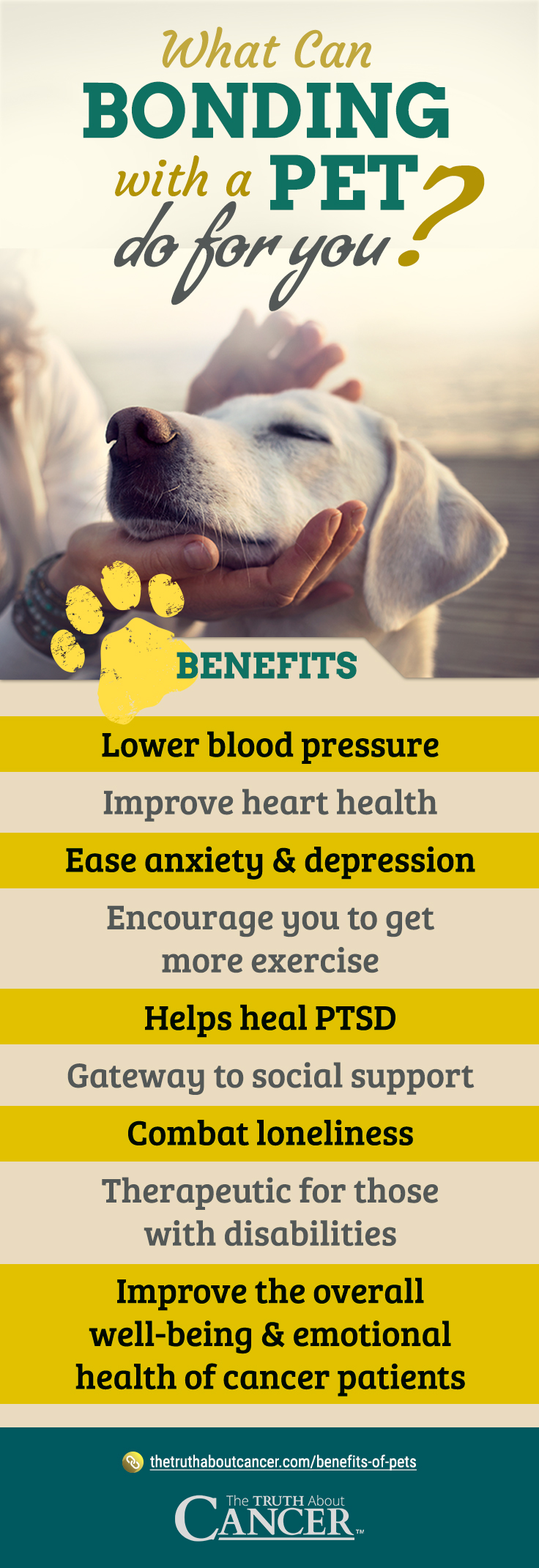No one will deny that America is a nation that loves pets. According to the ASPCA (American Society for the Prevention of Cruelty to Animals), roughly 44% of American households include a dog and about 35% include a cat. While dogs were originally domesticated during the Stone Age for protection against predators (and cats during Neolithic times as companions to royalty in Egypt), their roles have drastically changed for the modern world. The benefits of having a pet has taken on a deeper meaning when it comes to our health…
Whether for a good laugh, a brisk walk, a warm receiver of hugs, or to help outright with a disability, animals gently encourage us to lead more balanced, healthy, stress-free, and open-hearted lives. In fact, numerous studies have demonstrated that the health benefits of pets is significant. Their presence can have a profoundly positive effect not only on our mental health, but also on our physical well-being.
Benefits of Pets: Why Dogs & Cats Are So Good for Us
What is the research showing when it comes to the connection between pets and health? Some of the following health benefits of owning a pet may be obvious to you. Other benefits of pet ownership may come as a complete surprise. Here are 9 important ways that having a pet improves your health:
#1. Having a pet lowers blood pressure
According to the U.S. Centers for Disease Control, one in three Americans have hypertension (i.e. high blood pressure) − a known precursor to strokes, heart attacks, and kidney disease. In one study included in a special report by Harvard Medical School published in 2014, systolic pressure was approximately 7 mm Hg lower in older individuals who owned pets compared to non-pet owners, all other factors being similar. Other studies have tested dog ownership as an actual treatment for high blood pressure with similar results.
#2. Having a pet helps heart health
Cholesterol and triglyceride levels have been shown to be affected as well. In a well-known Australian study conducted in the early 2000s, close to 6,000 pet owners and non-pet owners − all men and women over 40 − were measured for total cholesterol and triglyceride levels. Across the board, pet owners had lower levels of both, even when they ate more meat and takeout foods than non-pet owners and all other factors were similar. The difference between male pet owners and non-pet owners was considered especially statistically significant.
#3. Having a dog or cat helps with anxiety and depression
Another study reported on by Harvard Medical School found that college students turned to their dogs for stress relief and comfort during stressful times. They relied on their pets more than they did their family or friends. And one study found that women dog owners could perform thinking skills better when their dog was in the room with them (even more than when their best friend was in the room). This makes sense. New studies by well-known author and researcher Dr. Kerstin Uvnas-Moberg of Uppsala University of Sweden have confirmed that dog-human bonding produces oxytocin in humans. This is the same hormone that creates intimate connections between mothers and infants.
#4. Having a dog promotes movement
Dogs especially need exercise — and that means you have to move with them! The United States Department of Health and Human Services recommends that people get approximately 30 minutes of moderate aerobic activity 5 times a week. This can include brisk walking or jogging, swimming, biking, hiking, dancing, kayaking, etc. These are all activities that most dogs love to do − yes, even the dancing! The result of all this activity? An increase in bone strength, less risk for obesity, cancer, and heart disease, and a lowering of stress for both you and your pet. According to Harvard Medical School: “Regular exercise is the closest thing that exists to an all-purpose tonic for good health.”
#5. Equine therapy can help heal PTSD (Post Traumatic Stress Disorder)
For those who have suffered through war situations, such as veterans with PTSD, animal interaction can provide a gentle way to begin healing trauma. A 2013 report published in the Journal of Rehabilitation Research and Development analyzed the participation of recent veterans in an equine-based physical and mental therapy program. The researchers from Baylor University in Texas found that after 12 sessions, participants experienced improvement in the majority of the physical, behavioral, and emotional “health domains,” including improvements in depression. After 24 sessions, the vets experienced significant improvements in almost all health domains.
#6. Pets prevent loneliness and provide a gateway for social support
Social isolation and the feelings of loneliness it can bring up is serious and has shown to lead to declines in health. In a 2005 report published in the journal Anthrozoos, “animal assisted therapies” were shown to improve the quality of life and mental attitudes of residents in a long-term care facility when in a group setting. This was even more so when residents could interact with animals one-on-one. Owning a pet or participating in animal therapy programs can also lead to increased opportunities for human interactions as well through vet visits, walks in the park, and other obligatory actions.
#7. Exposure to animals helps boost the immune system in children
A 2004 study in the Journal of Allergy and Clinical Immunology found that exposure to dogs and cats can lower a child’s chance of becoming allergic to pets by 33%. In addition, the researchers at the University of Wisconsin postulated that early exposure may even help build a better immune system overall.
#8. Pets can help if you have a physical disability
Down syndrome, autism, fetal alcohol syndrome, brain damage, cerebral palsy, spina bifida, autism, blindness, and deafness are specific conditions that can qualify both children and adults to participate in certified service dog and animal assisted therapy programs. Even Alzheimer’s Disease and PTSD patients can qualify for these programs. There are approximately 20,000 service dogs in the United States and dozens of organizations worldwide designed to help. Canine Companions for Independence and 4 Paws for Ability are two of the most well-known in the United States.
#9. Connecting with a pet helps on the cancer journey
The benefits of dogs for individuals on the cancer journey can come in the form of structured programs that provide animal interaction. They can also come more informally in the form of the emotional support you or a loved one may receive from your own pet along the way. According to a well-received 2015 study conducted by the Continuum Cancer Centers at Beth Israel Medical Center in New York, “animal-assisted visits (AAVs)” led to significant improvement in the overall well-being and emotional health of head and neck cancer patients undergoing combined radiation-chemotherapy treatments.
“As the patients’ physical function was declining…their social and psychological and emotional functioning actually improved,” Stewart B. Fleishman, a founding director of the Continuum Cancer Center, said in a recent interview. “You usually see, as physical function declines, social and emotional function declines as well. We saw the reverse.”
Commentary on the effectiveness of conventional cancer treatments aside, the fact that positive results caused by interactions with therapy dogs were so noticeable to be “statistically significant” is a true testament to the power of animal-human interaction.
Can Having a Dog or Cat Help Prevent Cancer?
A quote from Dr. Edward Creagan, an oncologist at the Mayo Clinic in Rochester, Minnesota, sums it up quite nicely:
“A pet is a medication without side effects that has so many benefits.”
The fact that our pets make us “feel good” is something that most have experienced directly. But can simply eliciting “good feelings” help with actual physical healing? You bet! As many experts note, positive emotions help turn off stress responses and turn on “relaxation responses.” Flipping the switch from stress to relaxation, in turn, helps to turn on “healing hormones” in the body − in particular, dopamine, oxytocin, and serotonin. These are the raw materials for repairing and healing at deepest levels.
Pet Parenthood Is a Big Responsibility
If you are considering the benefits of owning a pet, please make sure that it is a responsible decision for both you and your potential furry friend. The number of animals surrendered to shelters each year is staggering and it’s not fair to either of you to bring home an animal if you don’t have the time, energy, and support you need to take care their needs and yours.
While obesity and cancer are lifestyle-related conditions that plague the human population worldwide, the same goes for pets. Recent surveys have found that 56% of domestic dogs in the United States are obese. And the numbers of pets being diagnosed with cancer and illness is rising.
Want to make positive and immediate changes in your pets’ lives, so you can enjoy a longer time together – starting TODAY? Discover how in the groundbreaking documentary… The Truth About PET Cancer. Do your pet a favor and CLICK HERE to register your FREE spot today! You can watch the first episode now and get your name on the list to be notified when the series airs next.
Article Summary
Roughly 44% of American households include a dog and about 35% include a cat.
Their presence can have a profoundly positive effect not only on our mental health, but also on our physical well-being.
9 benefits of pets:
- Having a pet lowers blood pressure
- Having a pet helps heart health
- Having a dog or cat helps with anxiety and depression
- Having a dog promotes movement
- Equine therapy can help heal PTSD (Post Traumatic Stress Disorder)
- Pets prevent loneliness and provide a gateway for social support
- Exposure to animals helps boost the immune system in children
- Pets can help if you have a physical disability
- Connecting with a pet helps on the cancer journey
Recent surveys have found that 56% of domestic dogs in the United States are obese.
If you are considering the benefits of owning a pet, please make sure that it is a responsible decision for both you and your potential furry friend.





















My puppy died from cancer. But… she had E-Coli undiagnosed. The doctors couldn’t tell the difference between cancer and infection, apparently they look similar on a scan. We treat her with Chemo for a while which was a BIG MISTAKE with the E-Coli present. She had no chance of surviving because the Chemo weakened her immune system beyond repair.
How she got the infection and a possibility of a gingivi cancer was when we took her to the mountains and the was a white powder all over the trees and ground. Apparently there was heavy aerial spraying in the area. We were sitting near a tree where the heavy white powder fell off of the tree onto the rose bush below. The next day the rose bush was dead?
I thought, whatever that powder is, it is dangerous and the puppies noses are right in it – Baby got cancer that same year.
My understanding is that whatever was sprayed causes your own body unable to fight off infections and other illnesses.
I believe Baby’s message is important because, we didn’t know it at the time, but we did all the wrong things. First was the useless chemotherapy and not catching the infection in time. And, not starving the possible cancer and infection.
I now know because of what has been shared by Ty and Charleen and the many truthful and informative articles, I know what to do if anyone in my circle becomes ill starve the cancer and starve the infection. I have had a years long battle with a pesky sinus infection, I am staying away from sugar and carbs.
Thank you for all your hard work…
Alice
Having my two cats helped me reduce anxiety about my mother’s suffering from advanced breast cancer and her death. They were like my therapy cats because before I started owning cats, I suffered from a complete nervous outburst because of my mother’s serious illness.
It’s nice that you talked about how exposure to dogs and cats could lower a child’s chance of becoming allergic to pets by 33%. My wife and I want to have a pet so our son would have a playmate, so we are thinking of buying a pet dog. But before we do that, I think it would be better for us to take pet parent training first.